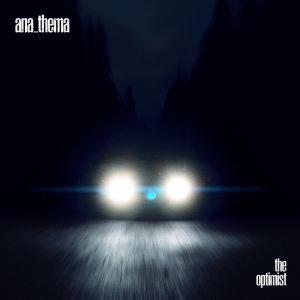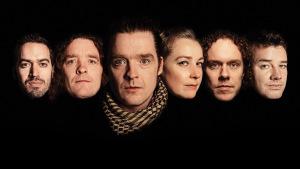 It’s been three years since Anathema’s Distant Satellites proved to be yet another critical success for this unique British band. Anathema’s sound has steadily evolved under the guidance of the Cavanagh brothers, from early doom and gothic metal to atmospheric rock and finally to a surprisingly adept blend of electronic music with progressive pop. If a band continues to evolve with each release, most albums in their discography could be considered “transitional,” and Distant Satellites was no exception; the first half featured the epic balladry that won the band so many fans via the Weather Systems album (2012) — including me! The second half of the record, however, featured fascinating electronic experiments like the production on the lovely “Take Shelter.”
It’s been three years since Anathema’s Distant Satellites proved to be yet another critical success for this unique British band. Anathema’s sound has steadily evolved under the guidance of the Cavanagh brothers, from early doom and gothic metal to atmospheric rock and finally to a surprisingly adept blend of electronic music with progressive pop. If a band continues to evolve with each release, most albums in their discography could be considered “transitional,” and Distant Satellites was no exception; the first half featured the epic balladry that won the band so many fans via the Weather Systems album (2012) — including me! The second half of the record, however, featured fascinating electronic experiments like the production on the lovely “Take Shelter.”
I felt that this represented a possible direction for future releases, a blend of that epic, emotionally driven sound with ambient music textures.
There does exist, of course (mainly to be found griping in YouTube comments) a faction of fans from the nineties seemingly desperate for their heroes to return to heavy riffing and leather jackets, but it appears that’s not going to happen. Happily for me! Instead of turning back, Anathema continues to look forward.
This album is supposedly a sequel of sorts to A Fine Day to Exit (2001), the album that initially saw Anathema throwing off the restrictive shackles of hard rock and expanding their sound. I like that album, and I can see how it’s thematically related to this one, but a knowledge of that album or any kind of narrative from it is not necessary to enjoy The Optimist. This is only nominally a “concept album,” more a loose theme and a series of impressions and emotions suggesting the protagonist’s internal and external journey (the latter presumably through the United States). The sense is of a person running away to a strange new land, only to find him or herself, and the self-examination that goes along with such a process.
The band itself claims this is its “darkest” music yet, which is a bit rich for a band that used to be so doomy that I’m surprised its early fans didn’t jump, en masse, off a cliff like lemmings after digesting each nineties album. It is, however, more proper to say this is the “moodiest” or “most atmospheric” music in their career; the mood is more ruminative and melancholy than depressing.
There are a couple of ways in which this album is a departure; first, the brothers C have never strayed farther from traditional song structure as they do here. Yes, there are a couple of potential sing-alongs (“Leaving it Behind,” “Can’t Let Go”), but most of the pieces almost have the effect of full-on ambient music, more an impressionistic series of textured musical passages than hummable pop.
Second, while the Cavanaghs and John Douglas (drummer, also a songwriter) have never exactly been marble-mouthed Bob Dylans, the lyrics on this album are so sparse as to be considered more mantras than verses, repeating and weaving in and out of the music. In less capable hands this might be annoying, but here these carefully chosen words serve as emotional emphasis, creating a hypnotic effect that is most attractive.
The songs are mostly piano- rather than guitar-driven, and considering that Daniel Cavanagh has revealed some pretty impressive piano skills in recent years (the A Sort of Homecoming concert DVD emphasises this), it can only be seen as an enhancement of the album’s ambient/chamber-pop sensibilities.
After a “field recording”-type of intro, “Leaving It Behind” is a slice of aggressive gothic rock (almost Killing Joke-y) that will satisfy certain fans and serves as a good introduction to the album’s narrative, such as it is, a declaration of the character’s determination to seek renewal.
That, however, is as “rawk” as this platter is going to get; “Endless Ways” returns us to more familiar recently visited territory, and Lee Douglas, the band’s female vocalist, has never sounded more ethereal but more self-assured than she does on this very beautiful piece that mixes electronics with strings a la “Ariel” (Distant Satellites) and “Untouchable Part 2” (Weather Systems). A new twist is a heavy dose of delay on the guitar (what some people consider “The Edge guitar”). The lyrics are repeated, as noted, a bit like a dreamy mantra: “there’s no way of knowing what will be waiting/there’s no way of knowing the dream I’m creating.”
This mood continues with the title track, a very impressionistic ballad of the road sung by Vincent Cavanagh that has some great lyrical imagery (albeit sparse again): “rabbit in the headlights, run away.” Vincent has never sounded more restrained than he does on this album; vocal pyrotechnics are almost nonexistent, replaced by a passionate control and subtlety. The song ends with the sort of buildup and crescendo that fans of the band have come to love, dominated by a repetitive, looping guitar lick.
At this point things will really start to upset the metal-heads, but “San Francisco” is hands-down the best track on the album, IMO. It sounds like it could come off a Michael Brook album (but better!), mixing frenetic beats with piano and “infinite” delay guitar in a pretty well perfect representation of beat-driven ambient rock. I’m sure even the band members themselves could never have imagined they’d become this good at making this kind of music.
“Springfield” was the initial prerelease teaser track, and it’s a nice slice of jammy space rock, albeit one of the slighter tracks on the album. It does feature the loudest guitars, for what it’s worth. Pleasant, though.
“Ghosts” again is a showcase for Lee Douglas’s keening voice, featuring long, sustained, plaintive held notes, repeating a few ominous words “Saw you/trick of the light.” They’re not breaking new ground here, but it is extremely beautiful.
“Can’t Let Go” is the most interesting of the “songs” … again, hypnotic, but driven by heavier drumming, chiming guitars, and vocals that almost parallel to the guitar parts like an alternative George Benson. Again, Vincent sounds subtle and controlled, but intense here. Sonically, it’s sort of a mixture of post-punk (Wire) with the experimental intensity of sometime labelmates Ulver.

The disembodied heads of Anathema wish to soothe your soul!
“Close Your Eyes” is something of a torch song with actual jazzy instrumentation, a vehicle for Lee Douglas (think of “A Natural Disaster” from 2003). This will probably be many people’s favorite song on the album. I enjoy the somewhat Robert Wyatt-ish feel that creeps in during the jazzier latter stages — are those horns and double bass I hear on there?
“Wildfires,” like “San Francisco,” is again experimental, piano- and beat-driven, more “chamber-pop” than any kind of rock. The use of heavy echo/delay on Vincent’s voice creates an otherworldly feel; the piece gets heavy at the end, more in the way that Sigur Rós occasionally “rocks out,” meaning more ambient noise than ass-kicking.
And finally, “Back to the Start,” a more classic rock type of song, feels slightly incongruous after all this glorious experimentation. However, it’s a poignant wrap-up to the concept (field recordings of acoustic guitar, perhaps representing our protagonist’s presence again, start and end the song) with somewhat inconclusive lyrics about the uncertainly of life. Musically it’s a mix of a mild Floydian influence (The Final Cut) with an uptempo, slightly gospelly group vocal ending that would feel at home on an album by The Verve, Primal Scream or Oasis. Took me by surprise, but not in an unpleasant way.
In conclusion, this album again offers a mixture of the band’s previous style and interests with a pushing of boundaries. The songs are as always about profound feelings between people and ruminations on life’s meaning … that never changes for this lot despite the themes or concepts employed.
The production remains epic and layered (I forgot to mention the string arrangements are still there, fortunately) but with less reliance on huge, emotional crescendos; there’s a greater sense of control, a tightness to be found here.
With a theme that appears to be renewal through leaving an old life and embracing a new one, leaving behind old patterns and sorrows, The Optimist proves once more that Anathema is likewise capable of renewing its sound with each release, relentlessly exploring opportunities to expand its sound. And that to me sounds like an unqualified success.



